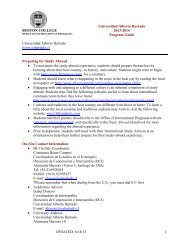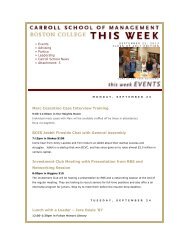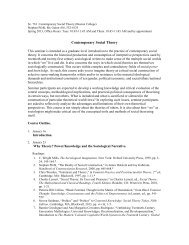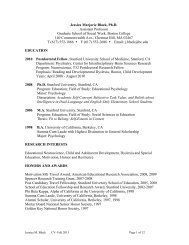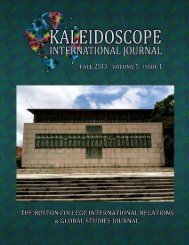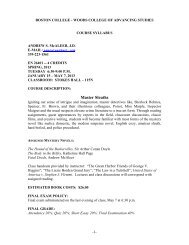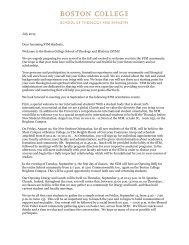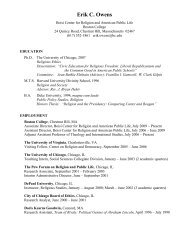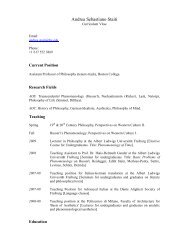separation of powers in thought and practice? - Boston College
separation of powers in thought and practice? - Boston College
separation of powers in thought and practice? - Boston College
Create successful ePaper yourself
Turn your PDF publications into a flip-book with our unique Google optimized e-Paper software.
2013] Separation <strong>of</strong> Powers <strong>in</strong> Thought <strong>and</strong> Practice? 441<br />
tions for the division <strong>of</strong> <strong>powers</strong>, like justification (b) above, might make<br />
no sense so far as the functional <strong>separation</strong> is concerned. In what sense<br />
are we to imag<strong>in</strong>e “self-susta<strong>in</strong><strong>in</strong>g competition” between, say, courts <strong>and</strong><br />
legislatures, particularly if courts are <strong>thought</strong> <strong>of</strong>, as they usually are <strong>in</strong><br />
the <strong>separation</strong>-<strong>of</strong>-<strong>powers</strong> tradition, as perform<strong>in</strong>g straightforward adjudicative<br />
functions rather than review<strong>in</strong>g legislation;28 <strong>in</strong> what sense can<br />
there be healthy competition between decid<strong>in</strong>g cases <strong>and</strong> mak<strong>in</strong>g law?<br />
On the other h<strong>and</strong>, the <strong>separation</strong> <strong>of</strong> <strong>powers</strong> may have features that<br />
are unpalatable from the perspective <strong>of</strong> the Division <strong>of</strong> Power Pr<strong>in</strong>ciple.<br />
The functional <strong>separation</strong> <strong>of</strong> <strong>powers</strong> may be associated with someth<strong>in</strong>g<br />
like a pr<strong>in</strong>ciple <strong>of</strong> legislative supremacy, at least <strong>in</strong> the sense that it envisions<br />
the legislature as hav<strong>in</strong>g an <strong>in</strong>itiat<strong>in</strong>g place on the assembly l<strong>in</strong>e <strong>of</strong><br />
law-mak<strong>in</strong>g/law enforcement. That is what John Locke <strong>thought</strong>,29 <strong>and</strong> I<br />
believe Vile is wrong to say that “the ma<strong>in</strong> objection to see<strong>in</strong>g Locke as a<br />
proponent <strong>of</strong> the doctr<strong>in</strong>e [<strong>of</strong> the <strong>separation</strong> <strong>of</strong> <strong>powers</strong>], even <strong>in</strong> a modified<br />
form, is his emphatic assertion <strong>of</strong> legislative supremacy.”30 Because<br />
Locke is emphatically not suggest<strong>in</strong>g that legislative supremacy entitles<br />
legislators to perform adjudicative <strong>and</strong> executive functions,31 Vile’s<br />
compla<strong>in</strong>t aga<strong>in</strong>st Locke must be premised on someth<strong>in</strong>g like the Division<br />
<strong>of</strong> Power Pr<strong>in</strong>ciple or the Checks <strong>and</strong> Balances Pr<strong>in</strong>ciple, not on<br />
the Separation <strong>of</strong> Powers Pr<strong>in</strong>ciple, <strong>in</strong> <strong>and</strong> <strong>of</strong> itself.<br />
I have less space to devote to it, but I th<strong>in</strong>k someth<strong>in</strong>g similar can<br />
be said about the relation between Separation <strong>of</strong> Powers <strong>and</strong> Check <strong>and</strong><br />
Balances. We did not <strong>in</strong>vent a dist<strong>in</strong>ction among legislative, executive,<br />
<strong>and</strong> adjudicative <strong>powers</strong> <strong>in</strong> order to establish the existence <strong>of</strong> entities<br />
that could check <strong>and</strong> balance one another. The Framers may have had a<br />
“vision that power should be divided <strong>and</strong> balanced creatively to prevent<br />
misuse,”32 but that was not the only vision <strong>in</strong> play,33 <strong>and</strong> not the vision<br />
28 See Mart<strong>in</strong> H. Redish & Elizabeth J. Cisar, “If Angels Were to Govern”: The Pragmatic<br />
Formalism <strong>in</strong> Separation <strong>of</strong> Powers Theory, 41 Duke L.J. 449, 454 (1991) (“[Under a formalist<br />
view], the Court’s role <strong>in</strong> <strong>separation</strong> <strong>of</strong> <strong>powers</strong> cases should be limited to determ<strong>in</strong><strong>in</strong>g<br />
whether the challenged branch action falls with<strong>in</strong> the def<strong>in</strong>ition <strong>of</strong> that branch’s constitutionally<br />
derived <strong>powers</strong>—executive, legislative, or judicial. If the answer is yes, the branch’s<br />
action is constitutional; if the answer is no, the action is unconstitutional.”).<br />
29 John Locke, Two Treatises <strong>of</strong> Government 366–67 (Peter Laslett ed., Cambridge<br />
Univ. Press 1988) (1690).<br />
30 Vile, supra note 9, 68–69.<br />
31 Locke, supra note 29, at 364–66.<br />
32 E. Donald Elliott, Why Our Separation <strong>of</strong> Powers Jurisprudence Is So Abysmal, 57 Geo.<br />
Wash. L. Rev. 506, 511 (1989).<br />
33 See, e.g., Lawrence Goldman, Introduction to The Federalist Papers, at ix, xvi (Lawrence<br />
Goldman ed., 2008) (“In view <strong>of</strong> the many sources <strong>of</strong> <strong>in</strong>ternal conflict between states<br />
[under the Articles <strong>of</strong> Confederation] there was a case for an enhanced national govern-



